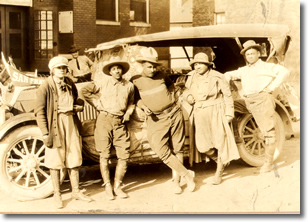Transportation

One of the most sought-after freedoms granted during Emancipation was freedom of movement. In theory, African Americans could walk on public roads, sit in public places, and ride on public conveyances. In practice, this soon proved not to be the case, as black Tennesseans were unfairly constrained by public officials and social custom. As the decades passed, the majority white Tennessee General Assembly began to pass restrictive regulations, soon known as “Jim Crow” laws, which curtailed many of these freedoms. Many, like young Memphis schoolteacher Ida B. Wells, challenged such discriminatory practices in courts of law.
On March 30th, 1905, the Tennessee General Assembly passed Bill Number 87, a “Jim Crow” law, which required streetcar operators to post signs designating separate sections for black and white passengers. Blacks who transgressed the seating assignment were subject to fines. In response to the bill, black citizens organized a boycott of the Nashville Transit Company. The movement was led by Reverend E.W.D. Isaac, editor of the Nashville Clarion, and Richard Henry Boyd, president of the Nashville Negro Business League and founder of the National Baptist Publishing Board. It also included support from J.C. Napier and other prominent business leaders. The group chartered the Union Transportation Company as an alternative for black travelers. The company soon began experiencing major mechanical issues. The steam-propelled buses lacked the power to navigate the city’s steep terrain at a regular schedule. The company then traded the buses for electric cars, but the car batteries were soon ruined by overcharging. It then installed its own electricity source, but it was unable to charge the batteries. This series of issues combined with the rising cost of operation forced the company to close in 1907. Despite the ultimate failure of the Union Transportation Company, it represented an organized and successful response to unjust restrictions in Jim Crow Tennessee.
For more information, see Bobby L. Lovett and Linda T. Wynn, eds. Profiles of African Americans in Tennessee (Nashville: Annual Local Conference on Afro-American Culture and History, 1996).
Lesson Plan
Jim Crow and the American Road Trip
Interactive Map
Related Content
Jim Crow Train, performed by Josh White in 1941. Full item record.